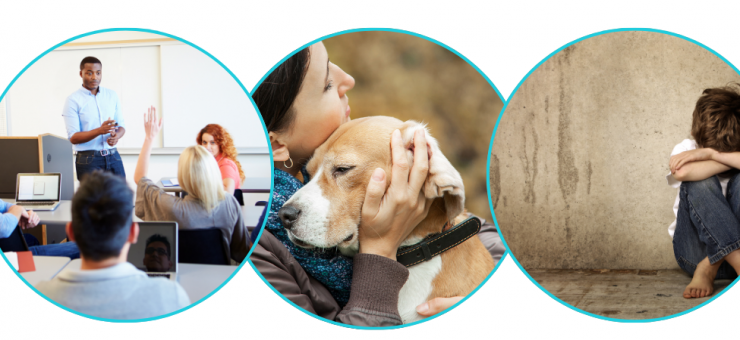
The Vitality of Safeguarding Qualifications for Educators
Educators, whether in traditional classrooms or specialised fields such as pet care, play a pivotal role in shaping the lives and experiences of those they serve. With this influence comes a profound responsibility to ensure the safety and well-being of every individual within their care. This responsibility extends not only to physical safety but also to emotional and psychological well-being, encompassing a holistic approach to safeguarding.
Enter the iPET Network Level 2 Award in Safeguarding for Pet Professionals, created by iPET Network and developed in collaboration alongside subject matter experts, such as SAHSDA, to create this NEW qualification. This qualification provides vital knowledge and understanding to educators and pet professionals to ensure they have the necessary tools to fulfill their safeguarding duties effectively and to improve the understanding between human and animal abuse.
What does this qualification entail? It goes beyond mere theoretical knowledge, delving into practical applications and scenarios to equip Candidates with a comprehensive understanding of safeguarding principles. From identifying signs of abuse to understanding safeguarding policies and procedures, candidates undergo rigorous training to ensure they are well-prepared to address safeguarding concerns in real-world settings.
One of the key strengths of this qualification lies in its inclusivity. It doesn't confine itself to one demographic but instead addresses the safeguarding needs of various populations, including children, adults, and companion animals. This broad scope ensures that educators and professionals are equipped to safeguard individuals across the spectrum, irrespective of age or species.
But why is such a qualification essential? Firstly, it serves as a legal requirement, ensuring compliance with safeguarding laws and regulations. Educators must adhere to legal standards to guarantee the protection of those under their care and to mitigate potential risks. Failure to do so not only jeopardises the safety of individuals but also exposes educators and organisations to legal liabilities.
Furthermore, a safeguarding qualification instils confidence and trust in educators. Parents, guardians, and pet owners entrust educators with the well-being of their loved ones, whether they be human or animal. By possessing a recognised safeguarding qualification, educators demonstrate their commitment to upholding ethical standards of care and protection, thereby fostering trust and credibility within their respective communities.
Ultimately, the significance of a qualification in safeguarding for educators cannot be overstated. It serves as a cornerstone in the foundation of ethical caregiving, empowering professionals to safeguard vulnerable populations effectively. Through comprehensive training and adherence to legal standards, educators can fulfil their duty of care with diligence and compassion, ensuring the safety and well-being of those they serve.
In conclusion, safeguarding is not merely a responsibility; it's a moral imperative. With the iPET Network Level 2 Award in Safeguarding for Pet Professionals, educators and pet professionals can rise to the challenge, equipped with the knowledge, skills, and understanding necessary to protect and nurture individuals and animals alike. In a world where every life is precious, safeguarding qualifications pave the way for a safer, more compassionate future.
iPET Network’s first Training Provider to be approved for the qualification is Maya Badham from Safeguarding Animal & Human Survivors of Sexual and Domestic Abuse (SAHSDA), you can find more information about SAHSDA at www.sahsda.org and you can the qualification and training days contact Maya on mayabadham@sahsda.org.
SAHSDA's aim is to encourage professionals from all sectors and disciplines to be professionally curious, recognise the signs of abuse against animals and humans and support them to use this knowledge to better safeguard and protect all survivors of abuse, regardless of species.
Below is more information regarding the link between animal abuse and neglect and human interpersonal violence and why education in Safeguarding is so important.
Perpetrators of domestic abuse, who have also been cruel to animals, have been found to be more controlling, dangerous, and violent, and utilise a wider range of abusive techniques than domestic abuse perpetrators who do not abuse animals.
Research investigating the link found that, 76% of survivors whose partners had histories of pet abuse had been strangled; 26% reported being raped, 80% feared that they would be killed by the perpetrator.
A study in New South Wales found that animal abuse is a better indicator of sexual assault, than previous convictions for homicide, arson, or weapons offenses. And we know that sexual assault is a high risk indicator of harm.
This only strengthens my position that in order to provide best practice risk assessment and safety planning, we need to effectively be utilising questions around past and present animal abuse. If we efficiently recognise the link and similarities in animal cruelty, neglect and abuse with violence against women, including domestic homicide, then we will be able to more effectively respond to both issues, improving the welfare for humans and animals and ultimate saving lives, regardless of species.
References:
- Campbell et al, Intimate Partner Violence and Pet Abuse: Responding Law Enforcement Officers’ Observations and Victim Reports From the Scene, 2021.
- National Link Coalition, The Link Between Violence to People and Violence to Animals, accessed January 26, 2024.
-Anthrozoos, 17(1), 26-41. Ascione, F. R., Weber, C. V., Thompson, T. M., Heath, J., Maruyama, M., & Hayashi, K. (2007). Battered pets and domestic violence: Animal abuse reported by women experiencing intimate violence and by non-abused women. Violence Against Women, 13, 354–373
- Barrett, B., Fitzgerald, A., Stevenson, R. and Cheung, C. (2017) ‘Animal Maltreatment as a Risk Marker of More Frequent and Severe Forms of Intimate Partner Violence’, Journal of Interpersonal Violence, pp. 1-20
